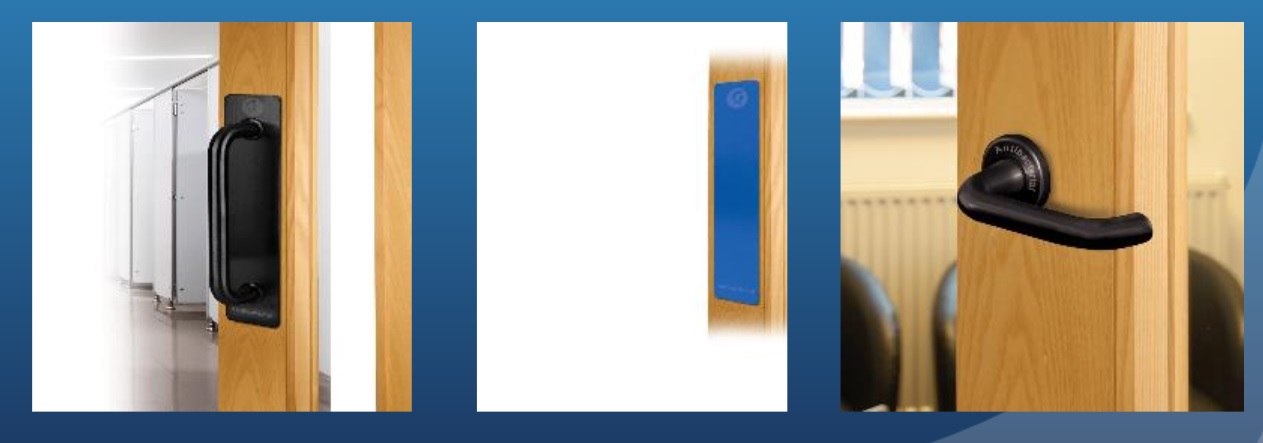A businessman’s invention could help the NHS to curb the spread of Norovirus, but the system for getting innovative products onto the wards continues to fail, he claims.
Speaking exclusively to Building Better Healthcare this week, Paul Cook, managing director of Titan Healthcare (Antibacterial) Products, revealed his attempts at getting his ‘unique and amazing’ product into the NHS have been thwarted at every turn.
After 18 months of research and development, Cook is ready to market his range of Steri-Core door handles, which have been found to kill one of the nastiest strains of Norovirus.
A lot of the normal handles have less than 1% of the biocidal material through them. I managed to get much more into mine. That has never been done before to my knowledge
Currently, he believes there are no other products on the market that can eradicate the F9 strain of Environmental Protection Agency-approved surrogate of Norovirus. This is the feline strain, and most products are tested to eradicate the, much-weaker, strain found in mice.
His journey started when he was selling chairs and other products to a hospital. He asked the infection control nurse what nurses wanted, above all else, and she told him what they really needed were door handles that could kill Norovirus.
Cook went away and eventually came up with a range of handles that, rather than being sprayed with a biocidal material that can be scratched off over time, have the science permeating throughout, giving them a longer life.
With no testing lab in the UK, Cook took his product to the US, where it was tested to the highest degree in a real-life environment.
The results showed that the handles killed over 99% of the F9 strain of Norovirus.
If you think of how much the NHS pays private companies to come in a clean wards when there is an outbreak, it seems only sensible to pay just a few pounds and stop the outbreak from occurring in the first place
Cook said: “A lot of the normal handles have less than 1% of the biocidal material through them. I managed to get much more into mine. That has never been done before to my knowledge. If it gets scratched, or even if it is chopped in half, the protection is still there.”
Cook’s handles not only kill F9 Norovirus, but many other healthcare associated infections, with superior kill times.
Now fire tested, proven to have biocidal properties, and patented, Cook is trying to get it to the nurses who highlighted the need for it in the first place.
He claims that, if fitted into hospitals, it could prevent the spread of the virus and stop wards from having to be closed and operations cancelled.
According to the World Health Organisation this could save more than £60billion a year.
He has already been called to the House of Commons to meet Andrea Jenkins, whose own father died in hospital after contracting the superbug, MRSA.
“She said what I had done was great,” Cook said. “So much so, that she forwarded my results to Dame Davies, the NHS’s chief medical officer.

Paul Cook is desperately trying to get the handles to the nurses who requested them
“Since then, I have also had interest from several billion-dollar companies who are looking to license the product. But I’m not keen to go down this route and am instead hoping to sell directly to the NHS.
And this is where, like many entrepreneurs before him, he has hit a brick wall.
He told BBH: “My handles cost much less than standard products. I could sell my finger plates, pullbars, and office handles at very-low prices compared to anything else on the market and mine kill F9 Norovirus. It’s crazy.
“If you think of how much the NHS pays private companies to come in a clean wards when there is an outbreak, it seems only sensible to pay just a few pounds and stop the outbreak from occurring in the first place.
I have spent my life savings producing a product nurses and infection control leads said they wanted, but I can’t get it to them
“But the NHS doesn’t seem to have this approach.”
As a small company based in Torquay, Titan doesn’t have the power of larger organisations.
Cook said: “I went to NHS Supply Chain and they told me I needed three years of audited accounts, which I don’t have yet.
“I then went to the Rapid Review Board, set up to help innovative products get into the NHS, and they rated it at level 4, the highest level for a product that has not undergone clinical trials in a hospital environment.
“Now, to get a top rating, I need trials, but I can’t find a hospital that will do it. Who in the NHS has time to go round swabbing my handles, then swabbing the normal handles, then reporting on this?”
Cook has also received a glowing report from the Scottish Health Innovation Portal and argues that the current procurement system means the NHS is paying more than it needs to.
“I wanted to get my range of chairs in the NHS and faced the same problems,” he said.
“A company that does work with them now sells them. They will buy off them, but they buy at a much-higher cost than if they came directly to me.
“You can’t get to tender. The NHS doesn’t want to give people like me a look in.
“I have spent my life savings producing a product nurses and infection control leads said they wanted, but I can’t get it to them.
“The whole process and the battle to try and get your products into the NHS has aged me.”
BBH has put Titan in touch with the UK Health Gateway, but if you can also offer help, please contact jom@hpcimedia.com
